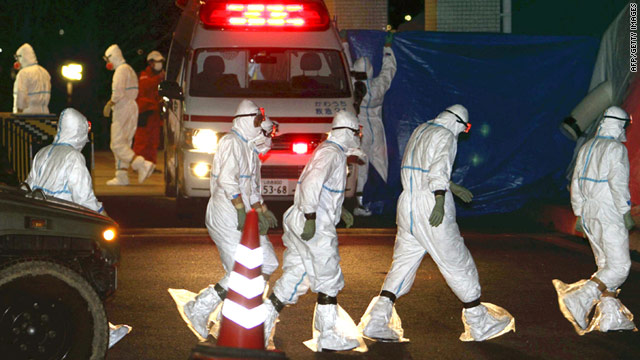 As radiation drifts westward from the recently battered Land of the Rising Plume, the U.S. is taking all necessary precautions to prevent a nuclear disaster on their own soil. Quickest to do their part appears to be the Environmental Protection Agency, which intends to counter harmful radiation exposure by proclaiming radioactive contamination now safer than ever!
As radiation drifts westward from the recently battered Land of the Rising Plume, the U.S. is taking all necessary precautions to prevent a nuclear disaster on their own soil. Quickest to do their part appears to be the Environmental Protection Agency, which intends to counter harmful radiation exposure by proclaiming radioactive contamination now safer than ever!
DAMN RIGHT: Gaining exposure
Transocean hails ‘best year’ in safety, gives execs bonuses, despite Gulf spill
 The company that owns the now-infamous Deepwater Horizon, the oil rig that caused immeasurable damage to the Gulf, recently applauded itself for the "best year in safety performance in our Company's history." The company, Transocean Ltd., rewarded its executives millions in bonuses for the achievement, according to the annual report it released yesterday.
The company that owns the now-infamous Deepwater Horizon, the oil rig that caused immeasurable damage to the Gulf, recently applauded itself for the "best year in safety performance in our Company's history." The company, Transocean Ltd., rewarded its executives millions in bonuses for the achievement, according to the annual report it released yesterday.
Steven L. Newman, Transocean's president and CEO, awarded himself $4.3 million in cash bonuses, stocks and options.
While Nuclear Waste Piles up in U.S., Billions in Fund to Handle It Sit Unused

While the nuclear crisis in Japan has focused attention on the risks of spent fuel piling up at the U.S.'s reactors, one curious fact has gone largely unnoted: There is $24 billion sitting in a "nuclear waste fund" that can't actually be used to pay for a safer way to store the waste at reactors.
In 1982, Congress passed the Nuclear Waste Policy Act, and the federal government effectively struck a deal with the nuclear industry: Reactor operators and their customers would pay a tax on the waste they produced, and the government would use the money to create a safe place to store it for generations.
Radiation in seawater off nuclear plant spikes to 1,250 times normal
 The measurements also showed high levels of cesium and were taken outside the discharge canal for the plant's Nos. 1, 2, 3 and 4 reactors.
The measurements also showed high levels of cesium and were taken outside the discharge canal for the plant's Nos. 1, 2, 3 and 4 reactors.
Readings from a short distance away, outside the Nos. 5 and 6 units' discharge canal, showed lower but still high radioactive iodine levels some 284 times above normal.
Polar Ice Loss Is Accelerating, Scientists Say
 One of the largest challenges in climate science is determining how the great ice sheets over Greenland and Antarctica will respond to the increase in temperatures expected from rising concentrations of heat-trapping emissions in the atmosphere.
One of the largest challenges in climate science is determining how the great ice sheets over Greenland and Antarctica will respond to the increase in temperatures expected from rising concentrations of heat-trapping emissions in the atmosphere.
On Wednesday, a research team led by a NASA scientist unveiled a new study that is sure to stir debate on the topic. The paper concludes that ice loss from both Greenland and Antarctica is accelerating, and that the ice sheets’ impact on the rise in sea levels in the first half of the 21st century will be substantially higher than previous studies had projected.
Gulf spill sickness wrecking lives

Nearly a year after the oil disaster began, Gulf Coast residents are sick, and dying from BP's toxic chemicals.
BP's oil disaster last summer gushed at least 4.9 million barrels of oil into the Gulf of Mexico, causing the largest accidental marine oil spill in history - and the largest environmental disaster in US history. Compounding the problem, BP has admitted to using at least 1.9 million gallons toxic dispersants, including one chemical that has been banned in the UK.
According to chemist Bob Naman, these chemicals create an even more toxic substance when mixed with crude oil. Naman, who works at the Analytical Chemical Testing Lab in Mobile, Alabama, has been carrying out studies to search for the chemical markers of the dispersants BP used to both sink and break up its oil.
Former Bush EPA Official Says Fracking Exemption Went Too Far; Congress Should Revisit
 When Benjamin Grumbles was assistant administrator for water at the Environmental Protection Agency in the George W. Bush administration, he oversaw the release of a 2004 EPA report that determined that hydraulic fracturing was safe for drinking water.
When Benjamin Grumbles was assistant administrator for water at the Environmental Protection Agency in the George W. Bush administration, he oversaw the release of a 2004 EPA report that determined that hydraulic fracturing was safe for drinking water.
Then he watched as Congress used those findings to bolster the case for passing a law that prohibited the EPA from regulating fracking under the Safe Drinking Water Act.
More Articles...
Page 143 of 201

 Environmental Glance
Environmental Glance






























